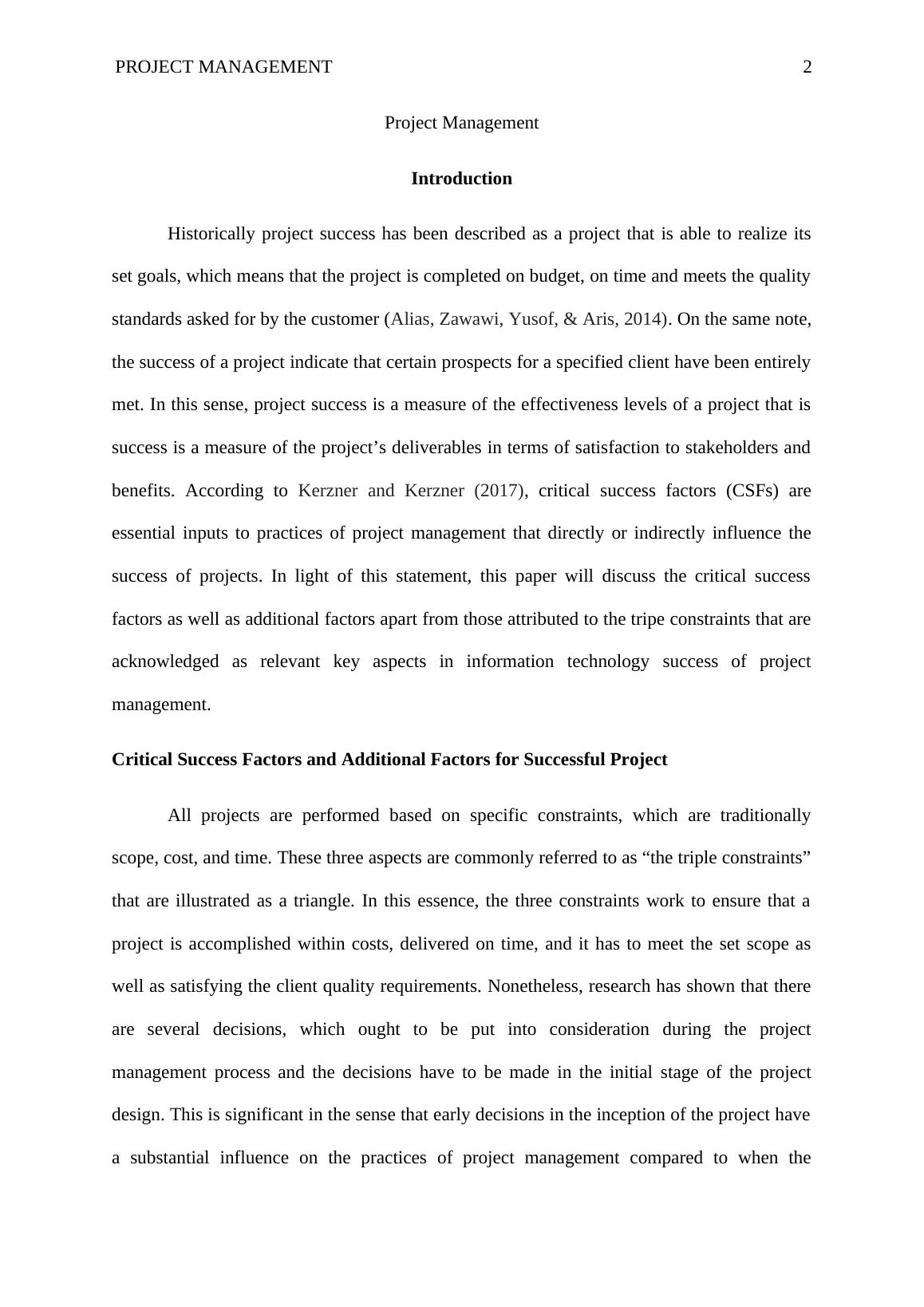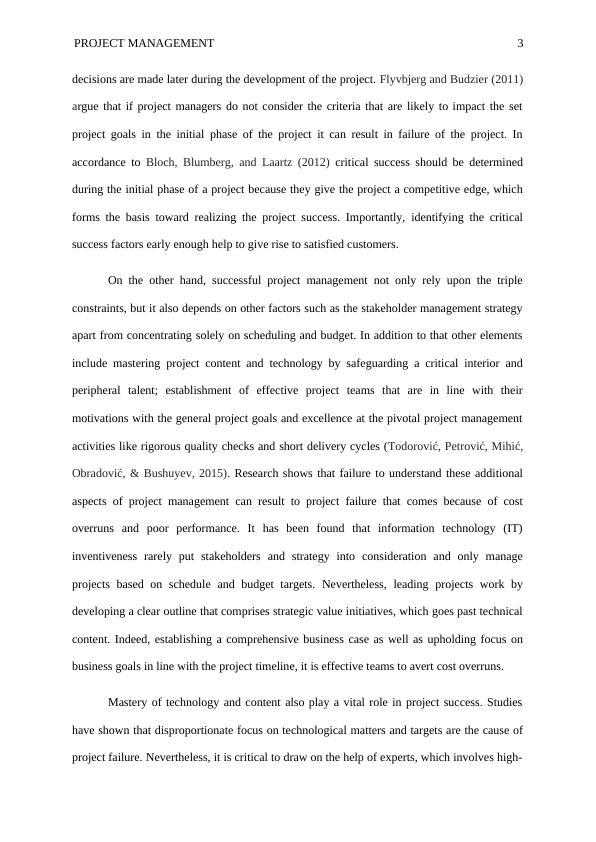Critical Success Factors and Additional Factors for Successful Project Management
Added on 2023-03-21
8 Pages1787 Words36 Views
Running head: PROJECT MANAGEMENT 1
Project Management
Student’s Name
Institutional Affiliation
Project Management
Student’s Name
Institutional Affiliation

PROJECT MANAGEMENT 2
Project Management
Introduction
Historically project success has been described as a project that is able to realize its
set goals, which means that the project is completed on budget, on time and meets the quality
standards asked for by the customer (Alias, Zawawi, Yusof, & Aris, 2014). On the same note,
the success of a project indicate that certain prospects for a specified client have been entirely
met. In this sense, project success is a measure of the effectiveness levels of a project that is
success is a measure of the project’s deliverables in terms of satisfaction to stakeholders and
benefits. According to Kerzner and Kerzner (2017), critical success factors (CSFs) are
essential inputs to practices of project management that directly or indirectly influence the
success of projects. In light of this statement, this paper will discuss the critical success
factors as well as additional factors apart from those attributed to the tripe constraints that are
acknowledged as relevant key aspects in information technology success of project
management.
Critical Success Factors and Additional Factors for Successful Project
All projects are performed based on specific constraints, which are traditionally
scope, cost, and time. These three aspects are commonly referred to as “the triple constraints”
that are illustrated as a triangle. In this essence, the three constraints work to ensure that a
project is accomplished within costs, delivered on time, and it has to meet the set scope as
well as satisfying the client quality requirements. Nonetheless, research has shown that there
are several decisions, which ought to be put into consideration during the project
management process and the decisions have to be made in the initial stage of the project
design. This is significant in the sense that early decisions in the inception of the project have
a substantial influence on the practices of project management compared to when the
Project Management
Introduction
Historically project success has been described as a project that is able to realize its
set goals, which means that the project is completed on budget, on time and meets the quality
standards asked for by the customer (Alias, Zawawi, Yusof, & Aris, 2014). On the same note,
the success of a project indicate that certain prospects for a specified client have been entirely
met. In this sense, project success is a measure of the effectiveness levels of a project that is
success is a measure of the project’s deliverables in terms of satisfaction to stakeholders and
benefits. According to Kerzner and Kerzner (2017), critical success factors (CSFs) are
essential inputs to practices of project management that directly or indirectly influence the
success of projects. In light of this statement, this paper will discuss the critical success
factors as well as additional factors apart from those attributed to the tripe constraints that are
acknowledged as relevant key aspects in information technology success of project
management.
Critical Success Factors and Additional Factors for Successful Project
All projects are performed based on specific constraints, which are traditionally
scope, cost, and time. These three aspects are commonly referred to as “the triple constraints”
that are illustrated as a triangle. In this essence, the three constraints work to ensure that a
project is accomplished within costs, delivered on time, and it has to meet the set scope as
well as satisfying the client quality requirements. Nonetheless, research has shown that there
are several decisions, which ought to be put into consideration during the project
management process and the decisions have to be made in the initial stage of the project
design. This is significant in the sense that early decisions in the inception of the project have
a substantial influence on the practices of project management compared to when the

PROJECT MANAGEMENT 3
decisions are made later during the development of the project. Flyvbjerg and Budzier (2011)
argue that if project managers do not consider the criteria that are likely to impact the set
project goals in the initial phase of the project it can result in failure of the project. In
accordance to Bloch, Blumberg, and Laartz (2012) critical success should be determined
during the initial phase of a project because they give the project a competitive edge, which
forms the basis toward realizing the project success. Importantly, identifying the critical
success factors early enough help to give rise to satisfied customers.
On the other hand, successful project management not only rely upon the triple
constraints, but it also depends on other factors such as the stakeholder management strategy
apart from concentrating solely on scheduling and budget. In addition to that other elements
include mastering project content and technology by safeguarding a critical interior and
peripheral talent; establishment of effective project teams that are in line with their
motivations with the general project goals and excellence at the pivotal project management
activities like rigorous quality checks and short delivery cycles (Todorović, Petrović, Mihić,
Obradović, & Bushuyev, 2015). Research shows that failure to understand these additional
aspects of project management can result to project failure that comes because of cost
overruns and poor performance. It has been found that information technology (IT)
inventiveness rarely put stakeholders and strategy into consideration and only manage
projects based on schedule and budget targets. Nevertheless, leading projects work by
developing a clear outline that comprises strategic value initiatives, which goes past technical
content. Indeed, establishing a comprehensive business case as well as upholding focus on
business goals in line with the project timeline, it is effective teams to avert cost overruns.
Mastery of technology and content also play a vital role in project success. Studies
have shown that disproportionate focus on technological matters and targets are the cause of
project failure. Nevertheless, it is critical to draw on the help of experts, which involves high-
decisions are made later during the development of the project. Flyvbjerg and Budzier (2011)
argue that if project managers do not consider the criteria that are likely to impact the set
project goals in the initial phase of the project it can result in failure of the project. In
accordance to Bloch, Blumberg, and Laartz (2012) critical success should be determined
during the initial phase of a project because they give the project a competitive edge, which
forms the basis toward realizing the project success. Importantly, identifying the critical
success factors early enough help to give rise to satisfied customers.
On the other hand, successful project management not only rely upon the triple
constraints, but it also depends on other factors such as the stakeholder management strategy
apart from concentrating solely on scheduling and budget. In addition to that other elements
include mastering project content and technology by safeguarding a critical interior and
peripheral talent; establishment of effective project teams that are in line with their
motivations with the general project goals and excellence at the pivotal project management
activities like rigorous quality checks and short delivery cycles (Todorović, Petrović, Mihić,
Obradović, & Bushuyev, 2015). Research shows that failure to understand these additional
aspects of project management can result to project failure that comes because of cost
overruns and poor performance. It has been found that information technology (IT)
inventiveness rarely put stakeholders and strategy into consideration and only manage
projects based on schedule and budget targets. Nevertheless, leading projects work by
developing a clear outline that comprises strategic value initiatives, which goes past technical
content. Indeed, establishing a comprehensive business case as well as upholding focus on
business goals in line with the project timeline, it is effective teams to avert cost overruns.
Mastery of technology and content also play a vital role in project success. Studies
have shown that disproportionate focus on technological matters and targets are the cause of
project failure. Nevertheless, it is critical to draw on the help of experts, which involves high-

End of preview
Want to access all the pages? Upload your documents or become a member.
Related Documents
Business Project Management - Learning Journallg...
|5
|898
|159
Project Planning and Control Methodslg...
|12
|2589
|428
Project Success and Failure: Factors and Causeslg...
|13
|3755
|1
Business Fundamentals Question Answer 2022lg...
|5
|854
|3
Project Management: Duplex Construction in Traralgonlg...
|14
|2576
|406
Project Success: Importance of Project Management and Key Factorslg...
|15
|2516
|349